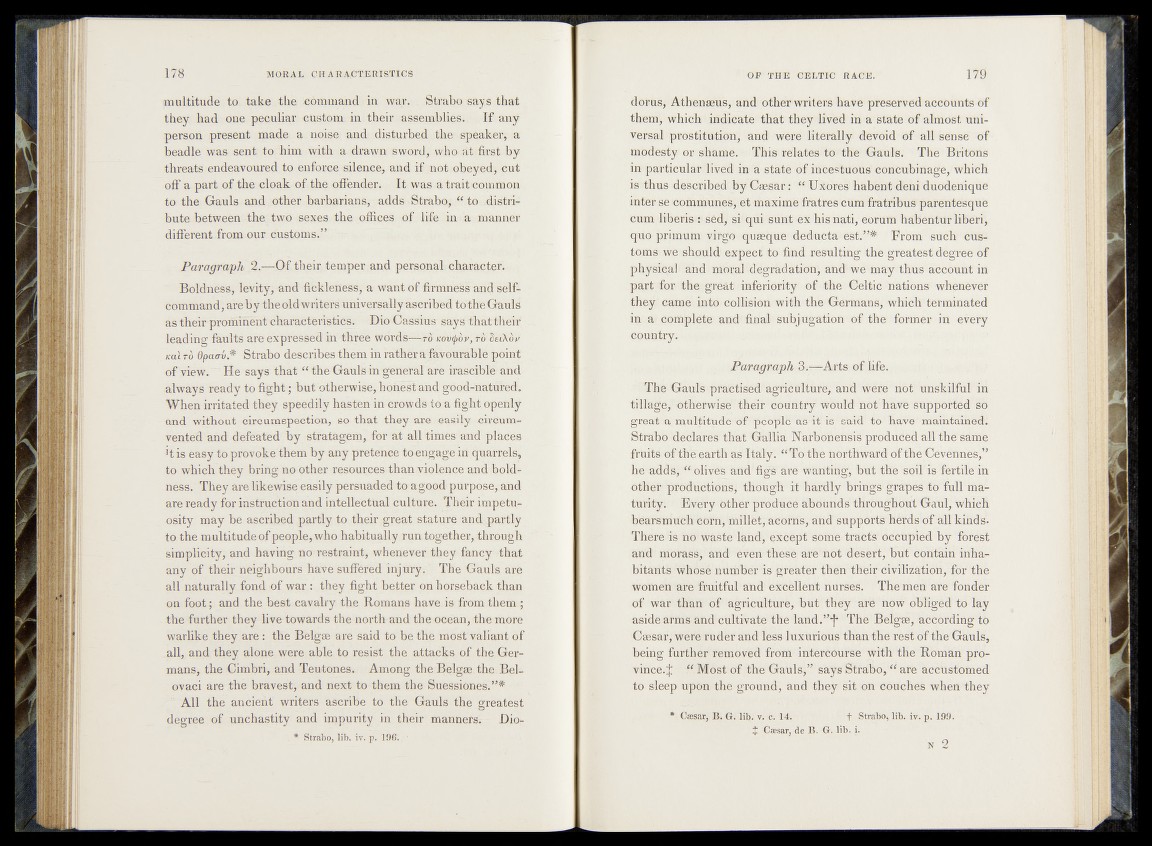
«multitude to; take th§ dèmmahd inwa ^ -St t a b© says that
they had, one peculiar @jb&t©mrm< their assemblies^' If any
person preseat made; apaojiiër^ ^ d iii^ lto ^ fe fc ^ i^ i'ê a k e ri a
beadle was* senfc torhim with -a drawn sword, wh^at,first- by
threats endeavoured to enfosoe silence, and if not obeyed, cut
off a part of thedoalLiofithe offender. It was a traitcommon .
to the Gauls, an d : other barharians, adds -Strabo^ % to distrri
butehetween the two -sexes, the offices o f life in a m anner
different from our customs.”
Paragraph their, temper:and personal; character;:;
~ B o ld n P ^ lèvity^nd-fickleöe'ês, a wantofffrtorië^^andfëff-
command, arebythe oldwriters universally aseribbd totheGaul#
as their prominent characteristies. DioCèésius s a y ^ b ^ tM ^ r’
leading faults are expressed in three wbrdS—fê Kovfybv,
Kaijfo Opaav* Strabo describes them in ratheXafa^ourablépöint
of view. He says that “ the Gauls in general are irasciblë and
always ready to fight; but otherwise, bdheStahd good-matured.
Wheia irritated they speedily hasten in crowds to a fight ppeMy
and without circumspection, so that they are (easily • Cr-muto-’
vented and defeated by stratagem^for'^t a ll 'tittrës 'anff places
Ris èasy to provoke them by any pretehde to engU^feurf Quarrels,
to which they bring no Other resources-than violence andbold-
ness. They are likewise easily persuaded to a good- pU-rpasei and
are ready for instruction and intellectual culture. The|r impetuosity
may be ascribed partly to their great stature and^partl^
to the multitude of people, who habitually run together, through
simplicity, and having no'restraint, whenever they fancyMhat
any of their neighbours have suffered injury. The Gaiils are
all naturally fond of w a r: they fight better on horseback than
on foot; and the best cavalry the Romans have.is from them:;
the further they live towards the north-and the ocean, the more
warlike they a re : the Belgae are said to be the most’valiant of
all, and they alone were able to resist the attacks of the Germans,
the Cimbri, and Teutones. Among the Belgae the Bel-
ovaci are the bravest, and next to them the Suessiones.,,#
All the ancient writers ascribe to the Gauls the greatest
degree of unchastity and impurity in their manners^- Dio*-
. *■ Strabo, lib. iv. p. 190i. ’
dorii#jfl Athenséus, and other writers have preserved accounts of
them'^hibl^indicat’e that they dived in a-Stole Of almost uni-
vers&fdpïièstitotiön'; a n # were lite ra lly devoid' of all sense of
modesty/ ©p s'M&uad.^ ' This relatés to the Gail#; The Britons
in particulirJM^ejf- in éif &ta$è ‘pf'iö&êsbiious" concubinage, which
i&Hhus described “ U&èp'èlthabën't dChiduodenique
inter shteotomUnes, lëtffiaxitoeffatres cum fratribus parentesquë
cum'lifeeri'S<i‘Sêd/ &hqui sunt ex his riafi/li>Jïiftf hhbehtür libéri;
qUOprimum virgp >q'uæque,*d,e'#ucta^ë^tf»?# From -su'éh custom
s* wef should* expect to find rejMlttpgdtoe 'greatest degree of
phy&i^ahfMlffi- moral dégradation; and’ we mây thùsmccôünt irt
part for theigreâfi'inferiority' of • the* Geltic «dations whenever
they* came- into?collision with - the-*Germans; which: terminated
in a» corhpléte and* final'subjugation/of the former in every
country. M ■<-«
Paragraph 3îr«^ifts pftkfq.u
The'Gàm^pfaetised''àgrieffiïufë;, and wèrë' ftöt Unskilful ill
WMge,f*©therwi!se^t‘herf*B©unti*y w0u'M*not havfe supported so
gtoâil^mMritude *öf ,:rpe6plë ‘ a# it‘ is «IsSIf to * have * maintained.1
S trd l^ fe ^ .w ^ th a t Gallia dTarb'rMfensi^proâüibfl'ifi the'Same
fruits- ©fiheeartîïas’ ‘Italy. “ Toth’ê horthward of the Cevefirids,
héadd#/'“ tblrfdfe and'fig^’ÏÏTe wanting/but the soil1 is fertilein
otMebprodtictioire, thdhgH it hardlybrin'gs1 grUpesÜö''full maturity;*
E'vCVy Other produce abound^ thrhù^fiôut Gaul, whieli
bearsmuch corn, millet; acorifs, ahd'SUppórts hérds of all kind#.
There‘is no’Waste land, except'soifie tracts1 Occupied by fiStoSt
and' morâs§;‘ and evëir these are not desfert, but cohtain inhabitants
whôsê number'is greater thètr’tllëif Civîlizatioh, for the
women are ftaitfiil and excèdent nUrse^:’1 The men are fonder
of war than of' agricultuië, but they are now obliged’ to lay
aside arms and cultivate' the land.”*f* The Belgèé, according to
Gæsar, were ruder and less luxurious than the rest of the Gkuls,
being forther removed frOrn intercourse1 with the Roman province.
J “ Most of the Gauls;” says Strabo, “ are accustomed
to sleep upon the ground, and they sit on couches when they
* Cassaï, B. G. lilj. v. c. 14. : f Strabo,lib. iv. p. 199.
î Caesar, de B. G. lib. i.
I 2